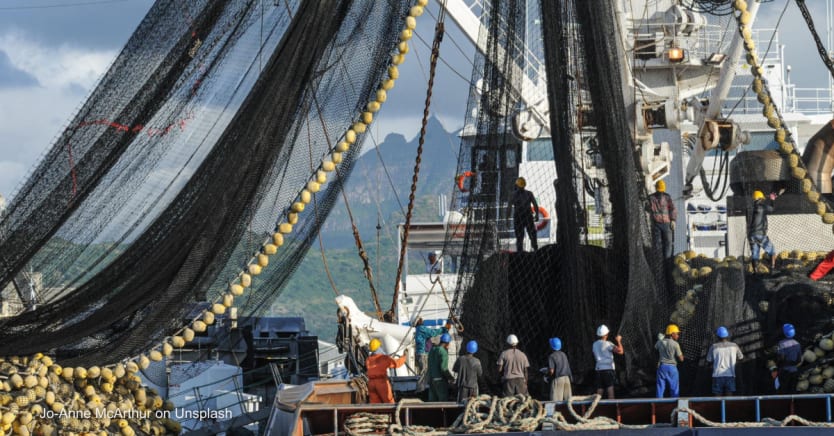
A third of our world’s fish populations are overfished, and illegal, unreported, and unregulated fishing, or IUU, is further depleting them, pushing ocean ecosystems toward total collapse. Meanwhile, the demand for unrealistically cheap seafood remains and unscrupulous operators turn to human trafficking and slavery to keep turning a profit.
What makes this vicious cycle of environmental destruction and human rights abuses possible is the shadowy nature of global fisheries. Complex supply chains and the opacity of fishing industry operations make it difficult to identify the fishing vessels and players involved, and where illegally caught fish end up.
Here is how and why all states must act, with the support of the private sector, international governmental institutions, and consumers, to minimize the damage done to our ocean, humans, and wildlife on board distant water vessels.
From China …
The steep challenge of uncovering unlawful activities at sea means that illegal operators are at low risk of capture and sanction by authorities. Catching those responsible is possible, but it requires painstaking work over many months, as a recent Environmental Justice Foundation investigation proved.
In the case of the Chinese distant water fleet, or DWF, insufficient monitoring, loopholes, and weaknesses in China’s regulatory framework reveal the need for transparency in global fisheries management.
China has the largest DFW in the world, which EJF’s research has linked to illegal fishing and human rights abuses on an industrial scale, despite the implementation of some regulations by the Ministry of Agriculture and Rural Affairs, or MARA.
While MARA oversees most activity of the DWF, provincial and municipal governments and other institutions manage the implementation and monitoring of their activities in practice.
This complex chain of command has meant that some responsibilities are unsupervised. Beyond this, the current regulations for DWF activities and vessels do not stop them from setting up front companies in West African countries. There are also instances of Chinese citizens living abroad who fish with vessels without names, home port, documentation, or vessels with stolen identities.
According to officially announced IUU fishing data from 2018, 2019, and 2020, MARA rarely initiates investigations of IUU fishing infringements, revealing a need for the Chinese government to be more proactive in its monitoring and publishing of IUU fishing notices by its fleet.
Our research has found that 89% of IUU incidents were carried out by vessels with DWF qualifications and 72% were projects approved by MARA, proving that current mechanisms for assessing fishing company qualifications are insufficient and action is urgently needed.
Within China, policy efforts must be concerted at both national and provincial levels of government. For example, at present, monetary sanctions are rarely placed on companies and are applied to the captain of the vessel instead.
Captains can be replaced easily, allowing for illegal operations to continue. The national government should also clarify the criteria that provincial governments should use when determining the level of financial penalties.
The steep challenge of uncovering unlawful activities at sea means that illegal operators are at low risk of capture and sanction by authorities.
—This is just one example of many. China needs a robust national legal framework to drive the reform of policies and regulations of the provinces, aligning the direction of the central and regional governments, and when action should be taken against vessel owners, captains, or both.
This national framework and alignment of goals must also meet international best practices for sustainable fishery and responsible management schemes. Through these concrete, straightforward steps, China can move toward a more sustainable DWF industry.
… To the world
Internationally, all supply chain players, from importers to processors, have a role to play in minimizing the risk of seafood tainted by illegal and unethical practices ending up on our supermarket shelves.
While the interwoven nets of fishing supply chains are hard to untangle, robust due diligence measures and assessing and holding companies accountable for any environmental destruction and human rights abuses they may drive must be implemented to end IUU fishing.
The best weapon we have against illegal fishing and human rights abuses is transparency. The clarity of information that comes with it will allow governments and companies to do their due diligence effectively.
We can achieve much stronger transparency in the fishing industry by making information on vessel tracking data, punishments for fisheries crimes, lists of fishing licenses, and the true owners of vessels public.
There needs to be a published, public, and searchable list of approved offshore fishery projects and all nations with distant water fleets must publish a national vessel registry where all vessel numbers are included.
Information in the Food and Agriculture Organization’s Global Record of Fishing Vessels on all DWF should also be comprehensive and kept up to date. Vessels should be given a unique number — no different from the reasonable expectation that a car should have a number plate.
The use of flags of convenience, which is the practice of countries allowing foreign-owned vessels to fly their flag without the ability or intention of overseeing their operations, should also be targeted by market, coastal and flag states, and seafood businesses throughout the supply chain to eradicate their use.
Only through collective, transparent action all along the supply chain can we hope to restore a healthy, thriving ocean. Our ocean is already on the brink of collapse, so there is no time to waste — let’s create a transparent fishing environment that is sustainable, legal, and ethical.

Search for articles
Most Read
- 1
- 2
- 3
- 4
- 5
